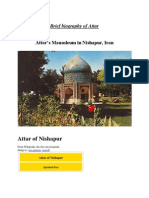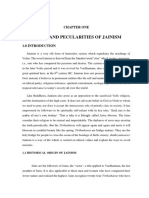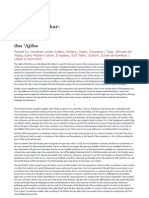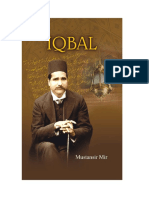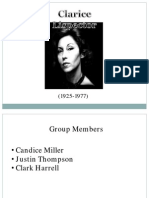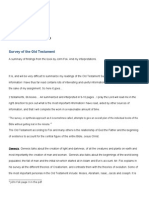Faghani by Nasir PDF
Faghani by Nasir PDF
Uploaded by
sanazhCopyright:
Available Formats
Faghani by Nasir PDF
Faghani by Nasir PDF
Uploaded by
sanazhOriginal Description:
Original Title
Copyright
Available Formats
Share this document
Did you find this document useful?
Is this content inappropriate?
Copyright:
Available Formats
Faghani by Nasir PDF
Faghani by Nasir PDF
Uploaded by
sanazhCopyright:
Available Formats
South Asian Studies A Research Journal of South Asian Studies Vol. 24, No. 1, January 2009, pp.
152-163
Faghani, the Fascinator of South Asian Persian Poets
Muhammad Nasir University of the Punjab, Lahore
ABSTRACT The impact of Persian language and literature on South Asia in general and Indo-Pak subcontinent in particular is unparalleled to any other language or literature. The cultural traditions, historical bequest, philosophical birthright, religious inheritance and literary heritage of the Muslims of South Asia have been preserved in Persian. Amazingly, this socalled foreign language remained the official and court language of South Asia during the Muslim period and even the Sikh regime followed the course. The classical Persian poetry is divided into three foremost literary styles, namely Khorasani, Iraqi and Indian. Baba Faghani, the founder and innovator of the Indian style has inspired the South Asian Persian poets to a great deal. His impact on every single poet of Indian style is significant and unparallel. More importantly, he was much highly esteemed in India than in his own country. In this article, poetry of Baba Faghani, the forgotten and neglected fascinator of South Asian Persian poets has been introduced and critically evaluated in the light of some renowned literary criticism and narration.
The Persian literature (Persian Literature. (n.d.). In Encyclopdia Britannica online. Retrieved March 16, 2008, from http://www.britannica.com) is privileged to have had sheer brilliance over the past thousand years. The history of world literature is left over and curtailed without extending a lions share to Persian poetry. In addition to that, in the same way, its great impact on Persian literature of South Asia is certainly high-flying. Persian has been the official, cultural, moral and literary language of the Sub-continent, through out the Muslim period and remained the focus of attention of the elite class of the society. The writers, poets, thinkers, philosophers and scholars have been expressing their thoughts, emotions, brilliance, intelligence and ideas in this so-called foreign but undoubtedly, the sweet and culturally rich language in a span of time, which is not less than ten centuries. Such miraculous happening is unparallel and unprecedented in the human history. 152
Muhammad Nasir Faghani: the Fascinator The classical Persian poetry is divided into following three major literary styles. Khorasani, (Mahjoub. n.d.): The Persian poetry of the earlier age got the name of Khorasani style.1 Iraqi: The middle age Persian poetry was named after another region, Araq-e-Ajam.2 Indian: The last classical style of Persian poetry emerged and flourished in Indian Sub-Continent and was named after Indian Style.3 However, for the interest of many, the founder, innovator and inspiration of this great style of Persian poetry was another great from Shiraz, the fertile land of poetry which had already produced some all time legends i.e. Saadi Shirazi (12101290) and Hafez Shirazi (1315-1390) and he was Baba Faghani (( ) d. 925 A.H. / 1519). The scope of Ghazal had amply widened by the ardent poets, and due to the changes in the cultural outlook of the people, erotic love, mysticism, philosophy, and moral and social values had become the subject matter of Persian Ghazal. Baba Faghani created a new school of poetry in the beginning of the Safawi period and poets followed him not only in Iran but also in India (Abdul Ghani, 1960:129130). Baba Faghani appears to be one of those poets who are much more highly esteemed in India than in their own country (Browne, 1930: 229-230). Poetry emerge from emotions and imaginations. Thoughts and sentiments provoke the inner feelings to the extent where the meanings of simple words are changed and overshadow each and everything of the universe. The teller and the listener both are mesmerized. Such a true poet is Baba Faghani who left impact on every single poet in the centuries to come. Baba Faghani is the great Persian poet of the later half of 9th century A.H. However, very little is known about his early life. The historians, literary critics and scholars have shown serious concerns and doubts even about his real name, his family, his parents and ancestors. However, undoubtedly, he belonged to Shiraz; (Fars), the birth place of many other great poets as earlier mentioned i.e. Saadi (d.1290), Hafez (d. 1390) and later Urfi (d. 1592). Some of the narrators of Persian poets ( ) have given some precious information (Khayyampur, 1993:714) about his youth and it is normally assumed that he used to live a dissolute life and was a habitual wine drinker. Soheili Khansari quotes from a manuscript as under: Whenever the moon of the holy month of Ramadhan was sighted, the doors of the wine cellars were put to shut for the whole month and were opened in the morning of Eid day. He along with another drunkard got some piece of meat and both confined themselves in a tavern, spent whole of the holy month inside that and drank quite a few pitchers of pure wine (Soheili Khansari, 1983:10). Faghanis own verses do verify this fact. As he says: (Faghani, 1983:207) 153
South Asian Studies 24 (1) Faghani lived during the reign of Sultan Hossein Mirza Baiqra and Amir Ali Shir Nawai (d.1481 A.D.) was his prime minister and both were great lovers and patrons of literature and Persian poetry in particular. Almost at the age of 30, Faghani paid a visit to Herat and according to many, he met with Nur-u-Din Abdar-Rahman Jami (( ) August 18, 1414November 19, 1492). Then he moved to Azerbaijan which was the centre of learning and knowledge during that time. Sultan Yaqub, the ruler of Azerbaijan, warmly welcomed Faghani and graciously called him Baba. However, after the demise of Sultan Yaqub, Faghani could not stay any more in Azerbaijan and returned to Khorasan.4 He spent 17 golden years of his life in Tabriz and Azerbaijan. The later part of his life was entirely different from his youth and middle age. Now he had become a true believer and pious and was no more a mere drunkard. The last days of his life remind us the life style of Baba Tahir.5 He secluded himself for religious service in Mashhad and later passed away in the same holy city in 925 A.H. but nobody has any clue of his grave to this date.6 In the beginning, his pen name was Sakkaki but in the collection of his available poetry not even, a single verse is seen having this pen name. The Divan e Faghani ( ) consists of Elegies (), Odes () , Composite Ties () , Stanzas ( )and Quatrains (). Farghani school of poetry was called Tazagui () . The Indian poets followed Faghani and this new element evolved a unique fineness not only in thought but also in expression. Time is akin to ever flowing river that captures everything coming to its way. It has nothing to do with tautness or rigidity. The same principle could be applied to poetry as well. Poets adopt different styles in different spans of time. The Khorasani style was known for its simplicity, utmost ease and natural fluency. The Iraqi style was flourished with the purification of language. During this period, technical terms of various fields of knowledge became the integral part of Persian poetry. Moreover, the Arabic influence was enhanced largely. Then a brand new style was introduced with thorny words, complicated terms, peculiar proverbs, innovative similes, spanking metaphors and furthermore ever increasing amphibology and later it was named the Indian style of Persian poetry. Faghani is the innovator, exciter and founder of this poetic style. Shibli Nomani (June 3, 1857 - November 18, 1914) admits that founder of the revolutionized poetic style in 10th century A.D. is no other than Faghani (Shibli. 27-30). Dr. Zabihullah Safa believes that Faghani actually led the Persian poets of 10th century and afterwards (Safa, 1994: 527-529). Baba Faghani was not a blind follower. He lit the candle of originality and literally created an ingenious style and inspired many generations to come. In the beginning, he faced many hurdles and people did not appreciate his comparatively complicated style and furthermore used to poke fun of its be calling Faghaniyeh (). But time tested his theory and proved his brilliance.7 154
Muhammad Nasir Faghani: the Fascinator Baba was a great admirer of Hafez Shirazi and he has truly reflected the glimpses of Hafezs imagery and imagination and love and lyric with unparallel sincerity and affection in his poetry. That is why many of the literary critics have called him The Little Hafez (( ) Rypka). Although Faghani is rightly considered the inventor of Indian style Persian poetry but the complexity and ambiguity that became the tradition of this style is not found with him. It could easily be called the stunning harmony of Iraqi and Indian style. In particular, he gave a new voice and lyricism to Persian Odes. During pre-Faghani era, the Persian Odes were not as simple but after having gone through his poetry, we find it quite simple. It seems that the poet is talking frankly and expressing our own sentiments (Soheili Khansari, 1983: Twenty Seven). There is not even a single complex verse found in his entire poetry and it could be easily claimed that his poetry is far from the negative features of notorious Indian style. The following few verses do justify such statement: (Faghani, 1983:88) (Faghani, 1983:163) (Faghani, 1983:209) Faghani introduced conciseness and novel intricacy with greater emphasis on freshness of similes and metaphors (Ghani, 1960). Following are the metaphors most frequently used by Baba:
(Faghani, 1983:406) (Faghani, 1983:320)
155
South Asian Studies 24 (1) (Faghani, 1983:286) (Faghani, 1983:292) ! (Faghani, 1983:408) Conciseness and brevity are the salient features of Indian style, and Faghani has exposed his proficiency in expressing enormous meanings in shortest possible lexis, like: (Faghani, 1983:228) (Faghani, 1983:125) (Faghani, 1983:408) (Faghani, 1983:218) (Faghani, 1983:368) (Faghani, 1983:123) (Faghani, 1983:121) (Faghani, 1983:78) Love is the integral part of his poetry. He is the most celebrated poet of 9th century A.H. as for as lyrical love songs are concerned. There is hardly any Ode in his collection of poetry where we do not find recipe of lusty love. (Safa, 1994: 527-529): 156
Muhammad Nasir Faghani: the Fascinator (Faghani, 1983:259) (Faghani, 1983:158) There is seldom a single verse without the pain of passion and fervour love. He was a devotee of love in true sense of the word and he has articulated it explicitly. Safa does not find a single Ghazal or even a verse in his poetry without strong passion (Safa, 1994:527-529). There is nobody to put off the fire and flames of his emotions. (Faghani, 1983:320) The tribe of grief has subjugated this feeble and helpless meager individual. (Faghani, 1983:127) Now even the heart rendering sighs seem futile (Faghani, 1983:153) Obsession of love and abundance of sentiments do stimulate or rather animate the poet and the reader as well. The insanity, madness and lunacy dominate all around and a state of intoxication is emerges. (Faghani, 1983:90) (Faghani, 1983:320) (Faghani, 1983:291) 157
South Asian Studies 24 (1) Faghanis personality went under drastic changes during the later part of his life as we observe in the lives of many others i.e. Sanai Ghaznavi (d. 1131 A.D.), Fariduddin Attar Nishapuri (1145-46-1221 A.D.) and Jalaluddin Muhammad Rumi (30th September 1207 to 17th December 1273). The true love dominates earthly desires and a drunkard becomes pious mystic. He is ashamed of his youth and regrets openly. Wine loving days are gone and he has got the secret of eternal life. Morality and ethics have replaced the lusty desires. (Faghani, 1983:317) (Faghani, 1983:139) (Faghani, 1983:405) (Faghani, 1983:78) He delivers the ultimate message to keep check on yourself and remain in peace and calm with the others, and then he adds that nothing could be achieved without going through strains and sorrows, furthermore advises to grab the aches with open arms. (Faghani, 1983:294) He is a pantheist and expresses his ideas boldly. He finds and observes the ultimate reality everywhere in the universe and resembles himself with flame and fire, and his heart spreads light all around. Moreover, he knows that the path of love guides towards the hereafter. 158
Muhammad Nasir Faghani: the Fascinator (Faghani, 1983:259) (Faghani, 1983:214) (Faghani, 1983:321) (Faghani, 1983:100) (Faghani, 1983:108) He is one of those rare literary figures who had a great impact on many centuries to come. His unique style soon became a school of thought and influenced thousands of poets. Although the style was named, Indian but we seldom find a poet who did not accept his supremacy especially in late 10th and 11th centuries A.H. He could easily be called the greatest ever exciter of South Asian Persian poets. Some great Iranian poets i.e. Urfi Shirazi (d.999 A.H.) Naziri Nishapuri (d.1021 A.H.), Taleb Aamoli (d.1036 A.H.) Abu Taleb Kaleem Kashani (d.1061 A.H.), Saib Tabrizi (d.1088 A.H.), Qodsi Mashhadi (d.1067 A.H.), Zohouri Tarshizi (d.1024 A.H) and Hazin Lahiji (1692-1766) etc. and renowned South Asian Persian poets i.e. Faizi Dakkani (1547-1595), Seraj Ali Khan Aarezu (d.1756), Bidel Dehlavi (1644-1721), Ghaleb Dehlavi (1797-1869) etc. followed his path. Following are few verses that reflect the beauty and elegance of his poetic skills: (Faghani, 1983:94) He claims the uniformity in his inner and outer self. It goes beyond saying that it is the distinctive feature of a true believer. (Faghani, 1983:95) 159
South Asian Studies 24 (1) His lyrical poetry is of utmost beauty and some of his golden verses remind us the unforgettable lyrics of other Indian style poets. (Faghani, 1983:179) (Faghani, 1983:320) (Faghani, 1983:166) The literary critics in all ages have admired his poetry at large, but the South Asian narrators have exclusively described him as the greatest exciter of Indian style poetry; A self-possessed lyrical poet with extraordinary skills (Aazar, 1898: 306). One of the most celebrated poets of Iran. This great fellow from Shiraz has sung some sweet verses (Sami, 1935: 102-103). The Poet of some elegant and subtle verses (Sepahsalar, 1937-39: 448-449). The most prominent poet of his age (Siddiq, 1914: 364-365). The most outstanding Ghazal poet of his age (Qodrat, 1957: 528). He appears to be one of those poets who are much more highly esteemed in India (Hosseini, 1292 A.H.: 242). Baba Faghani, the little Hafez, was a sensitive, kind-hearted man, a drinker, an ardent lover and a great poet (Nuri, 1260 A.H.:12). Saib Tabrizi (1601/1602- 1677 A.D.), one of the most celebrated and flourished poets of Indian style Persian poetry, has categorically accepted the great influence of Faghani on his poetry. He says: (Saib, 1994:355) Deep literary analysis and scientific evaluation reveals that Faghani could easily be named the most significant fascinator and exciter of every single follower of Indian style poetry in general and the South Asian Persian poets in particular.
160
Muhammad Nasir Faghani: the Fascinator
Notes
1. 2. 10th to 12th century A.D. It is also called the childhood period of Persian poetry and some great poets i.e. Rudaki Samarqandi (858-941), Abu Mansur Daqiqi (d.976/980), Asjadi (d.1072), Unsari (d. 1039/1040), Ferdowsi Tusi (935-1020), Farrokhi Sistani (d. 1037) and Manuchehri Damghani (d. 1040) produced some everlasting verses. Shahnama of Ferdowsi is still considered the best epic poetry. While initially overshadowed by Arabic during the Umayyad and early Abbasid caliphates, New Persian soon became a literary language again in the Central Asian lands. The rebirth of the language in its new form is often accredited to Ferdowsi and his generation, as he used pre-Islamic nationalism as a conduit to revive the language and customs of ancient Persia. In particular, says Ferdowsi himself in his Shahnama:
3. "For thirty years, I endured much pain and strife, with Persian I gave the Ajam verve and life" The 13th century marks the ascendancy of lyric poetry with the consequent development of the Ghazal into a major verse form, as well as the rise of mystical and Sufi poetry. This style is often called "Iraqi style", (western provinces of Iran were known as Araq-e-Ajam or Persian Iraq) and is known by its emotional lyric qualities, rich meters, and the relative simplicity of its language. Emotional romantic poetry was not something new however, as works such as Vis o Ramin by Asad Gorgani ( ( ) 11th century Persian poet), and Yusof o Zoleikha by Shihabuddin Am'aq ( ), a 12th century Persian poet, exemplify. Poets such as Sana'i (d.1131) and Attar (1145/1146-1221), who ostensibly have inspired Rumi (1207-1273), Khaqani Shirvani (1121/1122-1190), Anvari (1126-1189), and Nezami (1141-1209), were highly respected Ghazal writers. However, the elite of this school are Rumi (1207-1273), Sadi (12101290), and Hafez (1315-1390). In Persian tradition, only a highly respected person is named Baba. Baba is someone equally respected and honored as the father. As he admits in one of his verses:
4. 5.
6. "Stained with wine, Faghani sank into the earth, Alas if the angles should sniff at his fresh shroud". Baba Taher is known as one of the most revered and respectable early poets in Persian literature. Most of his life is clouded in mystery. He probably lived in Hamadan, the capital city of the Hamedan Province in Iran. He was known by the name of Baba Taher-e Oryan (The Naked) which suggests that he may have been a wandering dervish. Legend tells that the poet, an illiterate woodcutter, attended lectures at a religious school, where he was not welcomed by his fellow-students. The dates of his birth and death are unknown. One source indicates that he died in 1019. If this is accurate, it would make Baba Taher a contemporary of Ferdowsi and Pour Sina (Avicenna) and an immediate precursor of Omar Khayyam. Another source reports that he lived between 1000 and 1055, which is most unlikely. Reliable research notes speculate that Baba Taher lived for seventy-five years. Rahat al-sodur of Ravandi (completed 603/1206), describes a meeting between Baba Taher, and the Saljuq conqueror Togrel (pp. 98-99). He could be described as the first great poet of Sufi love in Persian literature. In the last two decades his do-bayts have often been put to music.
161
South Asian Studies 24 (1)
7. Surprisingly the history repeated itself in 20th century when Nima Yushij (18961959) (www.artarena.force9.co.uk/nima.htm), father and founder of the modern Persian poetry, introduced new ideology and people called the modern style poetry Nimai ().
References
Abdul Ghani. (1960); Life and Works of Abdul Qadir Bedil, Publishers United, Lahore, Pakistan. Aazar, Lotf Ali Baig. (1277 A.H.), Aatashkada (), Bombay, India. Browne, Edward.G. (1930); A Literary History of Persia, Volume IV, Cambridge University Press, United Kingdom. Faghani, Baba. (1983) Diwan-e-Ashaar-e-Baba Faghani Shiraza ) (, Compiled and edited by Soheili Khansari, Ahmad, Eqbal Publishers, Tehran, Iran. Hosseini, Mir Hossein Dost Sambhali, (1292 A.H.), Tazkar-e-Hosseini () Lakhnow, India. Khayyampur, Abdur Rasul, (1993), Farhang-e-Sokhanwaran () , Vol II, 1st Edition, Talayeh Publishers, Tehran, Iran. Mahjoub, Mohammad Jafar. (n.d.) Sabk-e-Khorasani dar Sher-e-Farsi, ) ( Ferdows Publishers, Tehran, Iran. Nuri, Nur-ud-Din Sharif Hosseini. (1260 A.H.), Majales-ul-Momenin, () Tehran. Iran. Qodrat, Qodratulllah Gopamvi. (1957), Nataej ul Afkar, ( ) Bombay, India. Safa Zabihullah. (1994) Tarikh-e-Adabiyat dar Iran ( ) Volume 5/1, 9th Edition, Ferdows Publishers, Tehran. Iran. Saib Tabrizi. (1994), Diwan-e-Saib Tabrizi, Preface by Shamisa, Sirus, 1st Edition, Marvi Publishers, Tehran, Iran. /Sami, Baig. Yad-e-Baiza. ( ) / Shibli Nomani. Sherul Ajam,( ). Siddiq, Mohammad Hassan Khan Bahador. (1293 A.H.), Sham-e-Anjoman, () India. Soheili Khansari, Ahmad. (1983) Diwan-e-Ashaar-e-Baba Faghani Shiraza, ) ( Compiled and edited by Soheili Khansari, Ahmad, Eqbal Publishers, Tehran, Iran. Rypka, Jan. History of Iranian Literature.
Online Encyclopedic References
http://www.britannica.com/EBchecked/topic/452843/Persian-literature/277131/Classicalpoetry http://www.britannica.com/EBchecked/topic/452843/Persian-literature http://www.britannica.com/EBchecked/topic/619744/Urfi http://encyclopedia.jrank.org/articles/pages/5496/Persian-Poetry.html http://en.wikipedia.org/wiki/Abu-Mansur_Daqiqi http://en.wikipedia.org/wiki/Amaq http://en.wikipedia.org/wiki/Anvari http://en.wikipedia.org/wiki/Asadi_Tusi http://en.wikipedia.org/wiki/Asjadi http://en.wikipedia.org/wiki/Azerbaijan
162
Muhammad Nasir Faghani: the Fascinator
http://en.wikipedia.org/wiki/Baba_Taher http://en.wikipedia.org/wiki/Fakhruddin_Asad_Gurgani http://en.wikipedia.org/wiki/Farid_al-Din_Attar http://en.wikipedia.org/wiki/Farrukhi_Sistan http://en.wikipedia.org/wiki/Ferdowsi http://en.wikipedia.org/wiki/Hafez http://en.wikipedia.org/wiki/Jami http://en.wikipedia.org/wiki/Khaqani_Shirvani http://en.wikipedia.org/wiki/List_of_Persian_poets_and_authors http://en.wikipedia.org/wiki/Manuchihri http://en.wikipedia.org/wiki/Nezami http://www.artarena.force9.co.uk/nima.html http://en.wikipedia.org/wiki/Persian_literature http://en.wikipedia.org/wiki/Persian_language http://en.wikipedia.org/wiki/Rudaki http://en.wikipedia.org/wiki/Jalal_ad-Din_Muhammad_Rumi http://en.wikipedia.org/wiki/Saadi http://en.wikipedia.org/wiki/Sanai http://en.wikipedia.org/wiki/Shahnama http://en.wikipedia.org/wiki/Shibli_Nomani http://en.wikipedia.org/wiki/Tabriz http://en.wikipedia.org/wiki/Unsuri http://en.wikipedia.org/wiki/Vis_u_Ramin
Biographical Note
Dr. Muhammad Nasir is Assistant Professor in the Department of Persian, Oriental College, University of the Punjab, Lahore.
163
You might also like
- Marsiye Literacy (Great Iran Com)Document24 pagesMarsiye Literacy (Great Iran Com)Mujahid Abbas100% (1)
- From The Circles of Sufis To The Ritual of Muharram - The Rite of Water Carier - Fdosjfdsbvcxjgfkjcn JdshcfdnxcbasdkfrhdkndjjbfasdDocument25 pagesFrom The Circles of Sufis To The Ritual of Muharram - The Rite of Water Carier - Fdosjfdsbvcxjgfkjcn JdshcfdnxcbasdkfrhdkndjjbfasdEmil PotecNo ratings yet
- Because I Could Not Stop For DeathDocument4 pagesBecause I Could Not Stop For DeathSnigdho Bhattacharya100% (1)
- SRF Sabk I HindiDocument59 pagesSRF Sabk I HindiShahnawaz SheikhNo ratings yet
- Amir Khusrau and His MathnawisDocument18 pagesAmir Khusrau and His MathnawisakhanNo ratings yet
- Rise of Persian Literature in IndiaDocument6 pagesRise of Persian Literature in IndiaAshutoshNo ratings yet
- Sa'di: The Poet of Life, Love and CompassionFrom EverandSa'di: The Poet of Life, Love and CompassionRating: 5 out of 5 stars5/5 (1)
- Gulistan Sa'diDocument330 pagesGulistan Sa'dipomegranate2460% (1)
- Modern Arabic Poetry A BackgroDocument52 pagesModern Arabic Poetry A BackgroAli ErenNo ratings yet
- Love and Desire in Pre-Modern Persian Poetry and Prose PDFDocument4 pagesLove and Desire in Pre-Modern Persian Poetry and Prose PDFHasina AhmadiNo ratings yet
- SLM An Introduction To Arabic LiteratureDocument105 pagesSLM An Introduction To Arabic Literaturedikshu99No ratings yet
- Rendezvous Between Shams of Tabriz and Rumi: Samtani ShyamDocument6 pagesRendezvous Between Shams of Tabriz and Rumi: Samtani ShyamSabeeqa JahangirNo ratings yet
- The World's Best Poetry, Volume 8 National Spirit by VariousDocument280 pagesThe World's Best Poetry, Volume 8 National Spirit by VariousGutenberg.orgNo ratings yet
- Structure and Meaning in Medieval Arabic and Persian PoetryDocument522 pagesStructure and Meaning in Medieval Arabic and Persian PoetrypoomerangNo ratings yet
- Inscription On Attar's TombDocument11 pagesInscription On Attar's TombMohammed Abdul Hafeez, B.Com., Hyderabad, India100% (1)
- Hansberger Kitab Al-Hiss Wal-Mahsus Aristotle's Parva Naturalia in Arabic Guise 2012.0Document16 pagesHansberger Kitab Al-Hiss Wal-Mahsus Aristotle's Parva Naturalia in Arabic Guise 2012.0Emiliano E. Serrano Lara100% (1)
- Creed of A H Ashari 5Document2 pagesCreed of A H Ashari 5Bechir HamedNo ratings yet
- The Poems of Mulhid VadetiDocument7 pagesThe Poems of Mulhid VadetiScottie GreenNo ratings yet
- Origin and Pecularities of Jainism: Chapter OneDocument16 pagesOrigin and Pecularities of Jainism: Chapter OneNikhil ThomasNo ratings yet
- Nilchian - PHD Thesis - 2011 PDFDocument271 pagesNilchian - PHD Thesis - 2011 PDFSara xxNo ratings yet
- (Resources in Arabic and Islamic Studies 8) Roger Allen - Selected Studies in Modern Arabic Narrative - History, Genre, Translation (2018, Lockwood Press)Document227 pages(Resources in Arabic and Islamic Studies 8) Roger Allen - Selected Studies in Modern Arabic Narrative - History, Genre, Translation (2018, Lockwood Press)FlorentNo ratings yet
- The Bulaq Diwan of Ibn ArabiDocument28 pagesThe Bulaq Diwan of Ibn ArabischolarlypurposeNo ratings yet
- The True Legacy of Tipu SultanDocument4 pagesThe True Legacy of Tipu SultanGopala RaoNo ratings yet
- My Appreciation and Critique of Bernard Lewis 17 September 2008Document6 pagesMy Appreciation and Critique of Bernard Lewis 17 September 2008bassam.madany9541No ratings yet
- Islamic Studies A BibliographyDocument67 pagesIslamic Studies A BibliographyAziz AşanNo ratings yet
- Tafsir Surah KawtharDocument6 pagesTafsir Surah KawtharShadowBent LoNo ratings yet
- Metaphor and Imagery in Persian PoetryDocument291 pagesMetaphor and Imagery in Persian PoetryArpegio Con AnimaNo ratings yet
- History of Greek LiteratureDocument9 pagesHistory of Greek LiteratureMy SiteNo ratings yet
- Hisham B. Al-Hakam - Arch-Heretic?Document17 pagesHisham B. Al-Hakam - Arch-Heretic?Islamic TranslationsNo ratings yet
- Islamic History TimelineDocument1 pageIslamic History TimelineNoshki NewNo ratings yet
- Exploring Sufi PoetryDocument35 pagesExploring Sufi PoetryAbdur RahmanNo ratings yet
- Farid Ad-Din Attār-Memorial of God's FriendsDocument465 pagesFarid Ad-Din Attār-Memorial of God's FriendsMubarak SulemanNo ratings yet
- The Shahnameh of Ferdowsi As World LiteratureDocument26 pagesThe Shahnameh of Ferdowsi As World LiteratureFelipe Antonio SantorelliNo ratings yet
- A Research On Aesthetic Representations in Three English Versions of Transient Days From The Perspective of Translation AestheticsDocument8 pagesA Research On Aesthetic Representations in Three English Versions of Transient Days From The Perspective of Translation AestheticsIJELS Research JournalNo ratings yet
- Translations of Eastern Poetry & Prose 1922Document236 pagesTranslations of Eastern Poetry & Prose 1922ahmad_fahmyalfar75_6100% (1)
- El-Rouhayeb, K. (2006) - Opening The Gate of VerificationDocument20 pagesEl-Rouhayeb, K. (2006) - Opening The Gate of VerificationYehya Abdul RahmanNo ratings yet
- History of The Arabic Written Tradition Supplement VolumeDocument135 pagesHistory of The Arabic Written Tradition Supplement Volumeari sudrajatNo ratings yet
- Chittic, Love in Islamic Thought Chittick-LibreDocument16 pagesChittic, Love in Islamic Thought Chittick-LibreankasoteckaNo ratings yet
- The Lament of Bābā UryanDocument13 pagesThe Lament of Bābā UryanSufi FaqirNo ratings yet
- Winter-Al-Nabulusi On The Religious Status of The DhimmisDocument13 pagesWinter-Al-Nabulusi On The Religious Status of The Dhimmishisjf100% (1)
- QIBLA MUSHARRIQA AND EARLY MUSLIM PRAYER IN CHURCHES by Suliman BashaerDocument17 pagesQIBLA MUSHARRIQA AND EARLY MUSLIM PRAYER IN CHURCHES by Suliman BashaerasadmarxNo ratings yet
- Diwan HallajDocument8 pagesDiwan HallajGul JeeNo ratings yet
- Johannes Peters - God's Created Speech - A Study in The Speculative Theology of 'Abd Al-JabbarDocument14 pagesJohannes Peters - God's Created Speech - A Study in The Speculative Theology of 'Abd Al-JabbarzostriNo ratings yet
- Archetype and Attribution in Early Arabic Poetry Al-Shanfara and The Lamiyyat Al-ArabDocument30 pagesArchetype and Attribution in Early Arabic Poetry Al-Shanfara and The Lamiyyat Al-ArabNefzawi99100% (1)
- Amir KhusrauDocument5 pagesAmir KhusrauSanyukta SharmaNo ratings yet
- His Holiness Hazrat Syed Shah Murshid Ali Al-Qaderi Al-Baghdadi (AS)Document3 pagesHis Holiness Hazrat Syed Shah Murshid Ali Al-Qaderi Al-Baghdadi (AS)Syed Mujtaba QuaderNo ratings yet
- Attar of NishapurDocument9 pagesAttar of NishapurAzothmagnumNo ratings yet
- Jeffrey Einboden DanteDocument15 pagesJeffrey Einboden DantepomahskyNo ratings yet
- Neo OrientalismDocument17 pagesNeo OrientalismVentura GarcíaNo ratings yet
- Before You Pause e BookDocument63 pagesBefore You Pause e BookNeema mohamedNo ratings yet
- Divan-I Kebir, Meter 4 by Jalaluddin RumiDocument6 pagesDivan-I Kebir, Meter 4 by Jalaluddin RumiRonan HarmanNo ratings yet
- Ibrahim Al Kurani and His Work EntitledDocument19 pagesIbrahim Al Kurani and His Work EntitledCarmen LaterazaNo ratings yet
- Bruinessen Haji Bektash Soltan SahakDocument26 pagesBruinessen Haji Bektash Soltan SahaknepherNo ratings yet
- History of Pakistani LitratureDocument3 pagesHistory of Pakistani LitratureZara JafriNo ratings yet
- Van BuitenDocument8 pagesVan BuitenChristina HowardNo ratings yet
- IqbalDocument145 pagesIqbalUsman MariNo ratings yet
- Al FarabiDocument22 pagesAl FarabiMellí ÞorkelsdóttirNo ratings yet
- Charismatic Leadership in Islam: The Powerful Position of Sufi Shaikhs in BosniaFrom EverandCharismatic Leadership in Islam: The Powerful Position of Sufi Shaikhs in BosniaNo ratings yet
- Avicenna's Theory of Science: Logic, Metaphysics, EpistemologyFrom EverandAvicenna's Theory of Science: Logic, Metaphysics, EpistemologyNo ratings yet
- Smiths Aerospace: Presentation To Investors DR John FerrieDocument20 pagesSmiths Aerospace: Presentation To Investors DR John FerriesanazhNo ratings yet
- Just War Theory PDFDocument22 pagesJust War Theory PDFsanazh100% (1)
- The Mongols PDFDocument71 pagesThe Mongols PDFsanazhNo ratings yet
- Wilson and World War I PDFDocument16 pagesWilson and World War I PDFsanazhNo ratings yet
- Mongolia PDFDocument43 pagesMongolia PDFsanazh100% (1)
- Part 2: Aztecs: Theme: The Purpose of Warfare in SocietyDocument26 pagesPart 2: Aztecs: Theme: The Purpose of Warfare in SocietysanazhNo ratings yet
- Principles of WarDocument15 pagesPrinciples of WarsanazhNo ratings yet
- Part 1: Mongols: Theme: Dealing With Conquered PeopleDocument25 pagesPart 1: Mongols: Theme: Dealing With Conquered PeoplesanazhNo ratings yet
- Tactics of The VietcongDocument13 pagesTactics of The VietcongsanazhNo ratings yet
- Peace PsychologyDocument56 pagesPeace Psychologysanazh100% (1)
- United States and World War I PDFDocument60 pagesUnited States and World War I PDFsanazhNo ratings yet
- Psychological Types PDFDocument51 pagesPsychological Types PDFsanazh100% (1)
- Approaches To HistoryDocument90 pagesApproaches To Historysanazh100% (2)
- Principles of StrategyDocument15 pagesPrinciples of StrategysanazhNo ratings yet
- Advocating For Your AgencyDocument34 pagesAdvocating For Your AgencysanazhNo ratings yet
- The Battle of AgincourtDocument11 pagesThe Battle of AgincourtsanazhNo ratings yet
- General Robert E. Lee PDFDocument11 pagesGeneral Robert E. Lee PDFsanazhNo ratings yet
- The Art of WarDocument15 pagesThe Art of Warsanazh0% (1)
- Pedro ParamoDocument11 pagesPedro Paramosanazh0% (1)
- Yasunari Kawabata 1899-1972Document24 pagesYasunari Kawabata 1899-1972sanazh100% (2)
- Luigi PirandelloDocument22 pagesLuigi PirandellosanazhNo ratings yet
- Clarice LispectorDocument18 pagesClarice Lispectorsanazh100% (1)
- Magical RealismDocument17 pagesMagical Realismsanazh100% (2)
- Huffing Police Report 1Document3 pagesHuffing Police Report 1TimMarchmanNo ratings yet
- Dead Poets SocietyDocument3 pagesDead Poets Societyapi-3754905100% (2)
- The Names of History RanciereDocument68 pagesThe Names of History Rancierefromdesiretodrive0% (1)
- 1st Quarter Summative Test 21stDocument8 pages1st Quarter Summative Test 21stajinjin0804No ratings yet
- Activities 7 8Document4 pagesActivities 7 8Lunar Shanley DeanneNo ratings yet
- Q1 Choose An Appropriate Answer From The Options Provided. (MCQS)Document4 pagesQ1 Choose An Appropriate Answer From The Options Provided. (MCQS)Ali RazaNo ratings yet
- Eng G12G T1 CH01Document76 pagesEng G12G T1 CH01seniors 1833% (6)
- Celtic EncyclopediaDocument603 pagesCeltic EncyclopediaTempus Loghyr100% (4)
- Unwind Analysis EssayDocument7 pagesUnwind Analysis Essayapi-251842097No ratings yet
- Easter 1916: Question & AnswerDocument3 pagesEaster 1916: Question & AnswerKalpana PalNo ratings yet
- The Little Red CapDocument2 pagesThe Little Red CapVidhyodh LokugeNo ratings yet
- Cowell Calcutta Review 1858Document14 pagesCowell Calcutta Review 1858Javier HernándezNo ratings yet
- MacbethDocument5 pagesMacbethruchaNo ratings yet
- Ancient Book WritersDocument2 pagesAncient Book WritersDeepika KanoriaNo ratings yet
- Document 2Document6 pagesDocument 2S.PrasannaVenkateshNo ratings yet
- JAYAMANGALA GathaDocument4 pagesJAYAMANGALA GathaRavi ChanderNo ratings yet
- Leagues Under The Sea Was Written by Jules VerneDocument8 pagesLeagues Under The Sea Was Written by Jules VerneNOOR HARLINA ABDUL JALILNo ratings yet
- Poetry Unit TestDocument9 pagesPoetry Unit TestshannonlaurelleNo ratings yet
- The Canterbury Tales: Geoffrey ChaucerDocument13 pagesThe Canterbury Tales: Geoffrey ChaucerSakthi EeswaranNo ratings yet
- Alice CharacterDocument2 pagesAlice CharacterBAMANMURA K K BALIKA VIDYALAYA HSNo ratings yet
- Thesevensorrows 171223130003Document18 pagesThesevensorrows 171223130003Amir DehdariradNo ratings yet
- Kamala DassDocument36 pagesKamala DassSasi SpartanNo ratings yet
- Venets Volume 1 Number 3Document146 pagesVenets Volume 1 Number 3ⰒⰅ ⰕⰡ ⰅⰂⰔ ⰕⰀ ⰕⰋⰅѵⰀNo ratings yet
- 13308-Article Text-49029-1-10-20230224 PDFDocument7 pages13308-Article Text-49029-1-10-20230224 PDFMuhammad AndreNo ratings yet
- Survey of The Old Testament SummaryDocument36 pagesSurvey of The Old Testament SummarygodsdragonNo ratings yet
- Talal-Gary Snyder's "Tomorrow's Song"Document3 pagesTalal-Gary Snyder's "Tomorrow's Song"talal.saleh2203No ratings yet
- Analysis of The Passionate Shepherd To His Love - CttoDocument3 pagesAnalysis of The Passionate Shepherd To His Love - CttoLigie Morales50% (2)
- Worksheets Christmas 2Document2 pagesWorksheets Christmas 2Phương Thu Vũ ThịNo ratings yet
- Rizal'S Life: Family, Childhood: and Early EducationDocument18 pagesRizal'S Life: Family, Childhood: and Early EducationAiza BarriosNo ratings yet















